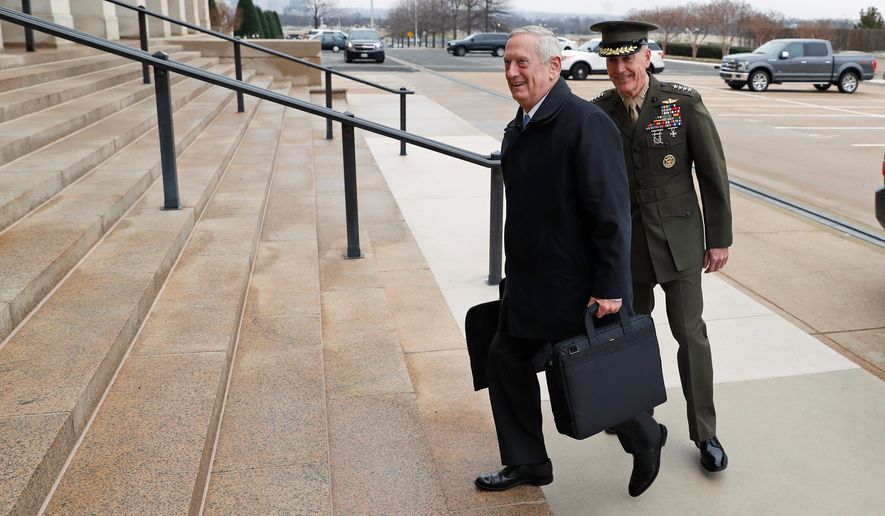Military advisers close to Defense Secretary James N. Mattis are considering loosening the restrictions on U.S. airstrikes that the Obama administration kept in place in war against the Islamic State in Iraq, according to current and former U.S. officials.
A key tenet of the proposed revised rules of engagement would raise the “acceptable” number of estimated collateral civilian casualties to authorize a U.S. or allied airstrike, sources say. Loosening these restrictions would give American commanders a freer hand in ordering strikes against the Islamic State’s northern Iraqi stronghold of Mosul, which the Trump White House has strongly advocated.
One source, who recently left a high-level position in the department, said Mr. Mattis’ team is believed to be carefully weighing the matter, with the expectation that the Trump White House would support such a move.
Another Pentagon official, who spoke on the condition of anonymity, told The Washington Times that the department has not formulated any specific plan, but could not rule out that such a high-level policy change was being considered.
“I can tell you that isn’t something that we are working on right now, but that’s not to say something like that won’t happen,” the official said.
President Trump has repeatedly cited the Islamic State as his top national security priority, echoing his rhetoric during the election. Shortly after his election, Mr. Trump said the Islamic State “must be eradicated from the face of the earth” and revived in an interview with Fox News a proposal to “take out the families” of known Islamic State terrorists as well.
On the campaign trail, he repeatedly criticized the conduct of the U.S.-Iraqi campaign to retake Mosul, Iraq’s second-largest city, and accused the Obama administration of telegraphing its plans.
“We’re sending leaflets down [saying,] ’In an hour we may be bombing your truck.’ Please remove yourself from — we are — we don’t know what we’re doing,” Mr. Trump told Fox News in April.
Multiple reports said the Trump transition team was looking at altering the rules of combat with the Islamic State, long before Mr. Mattis, a decorated former Marine general, was nominated as defense secretary.
A senior U.S. military official told a small group of reporters at the Pentagon that “a lot of those discussions are ongoing” about what more the U.S. can do.
On Wednesday, the top U.S. ground commander in Iraq said there had been no changes to the rules of engagement for American forces, including air operations, but didn’t categorically rule out modifications down the line.
“Our mission has not changed, and we’re operating under the exact same set of authorities [and] our orders here have not changed since the 20th of January,” Army Maj. Gen. Joseph Martin told reporters at the Pentagon.
“I’m not going to be able to speculate on what the future will hold,” he added during a briefing from Baghdad.
During the height of the Iraq War, the number of acceptable civilian casualties resulting from U.S. airstrikes hovered around 30. But that number tends to fluctuate, depending on the target value, time sensitivity and other mitigating circumstances, military officials said.
On Thursday, Pentagon spokesman Maj. Adrian Rankine-Galloway said he could not comment on the purported changes to the rules of engagement, or the specific ratios of acceptable civilian casualties used to determine whether coalition airstrikes are carried out.
The ratios are part of the sensitive tactics, techniques and procedures used by U.S. and coalition forces to execute combat operations against the Islamic State or other extremist groups, he added.
Gen. Martin on Wednesday did acknowledge a surge in U.S. and coalition air operations in Mosul, coinciding with increased movement by Iraqi forces pushing into the western half of the city. But the general said that increase in fighting was part of the three-month campaign and was unrelated to the change in administrations in Washington.
“Around the end of one administration, beginning of a new one, you saw that there was a change in operations here, but it was a function of the Iraqis taking an operational opportunity to reflect on what had happened” in the fight to liberate eastern Mosul, Gen. Martin said.
“We will conduct the fight the same way we’ve conducted the fight from the beginning” until ordered otherwise, he said.
• Carlo Muñoz can be reached at cmunoz@washingtontimes.com.
• Guy Taylor can be reached at gtaylor@washingtontimes.com.




Please read our comment policy before commenting.